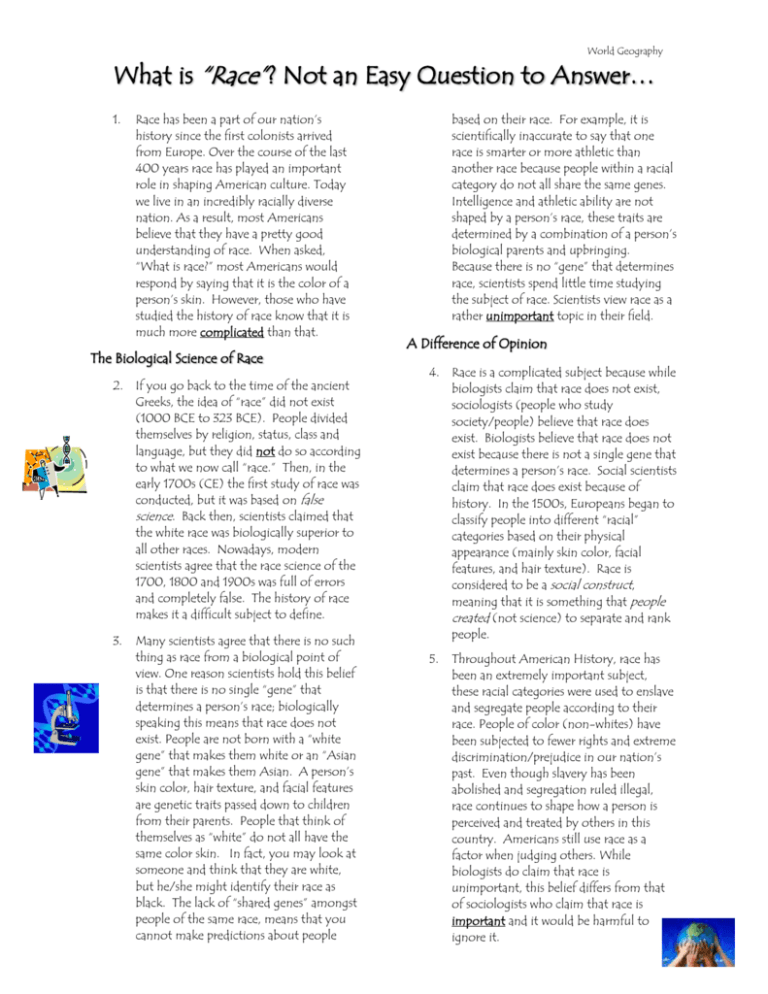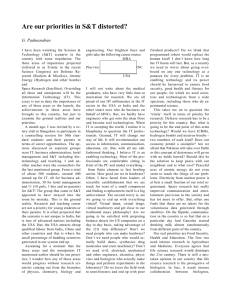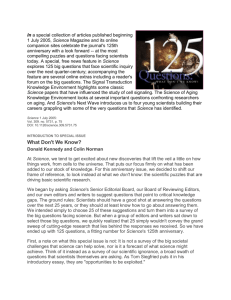What is “Race”? Not an Easy Question to
advertisement

World Geography What is “Race”? Not an Easy Question to Answer… 1. Race has been a part of our nation’s history since the first colonists arrived from Europe. Over the course of the last 400 years race has played an important role in shaping American culture. Today we live in an incredibly racially diverse nation. As a result, most Americans believe that they have a pretty good understanding of race. When asked, “What is race?” most Americans would respond by saying that it is the color of a person’s skin. However, those who have studied the history of race know that it is much more complicated than that. The Biological Science of Race 2. If you go back to the time of the ancient Greeks, the idea of “race” did not exist (1000 BCE to 323 BCE). People divided themselves by religion, status, class and language, but they did not do so according to what we now call “race.” Then, in the early 1700s (CE) the first study of race was conducted, but it was based on false science. Back then, scientists claimed that the white race was biologically superior to all other races. Nowadays, modern scientists agree that the race science of the 1700, 1800 and 1900s was full of errors and completely false. The history of race makes it a difficult subject to define. 3. Many scientists agree that there is no such thing as race from a biological point of view. One reason scientists hold this belief is that there is no single “gene” that determines a person’s race; biologically speaking this means that race does not exist. People are not born with a “white gene” that makes them white or an “Asian gene” that makes them Asian. A person’s skin color, hair texture, and facial features are genetic traits passed down to children from their parents. People that think of themselves as “white” do not all have the same color skin. In fact, you may look at someone and think that they are white, but he/she might identify their race as black. The lack of “shared genes” amongst people of the same race, means that you cannot make predictions about people based on their race. For example, it is scientifically inaccurate to say that one race is smarter or more athletic than another race because people within a racial category do not all share the same genes. Intelligence and athletic ability are not shaped by a person’s race, these traits are determined by a combination of a person’s biological parents and upbringing. Because there is no “gene” that determines race, scientists spend little time studying the subject of race. Scientists view race as a rather unimportant topic in their field. A Difference of Opinion 4. Race is a complicated subject because while biologists claim that race does not exist, sociologists (people who study society/people) believe that race does exist. Biologists believe that race does not exist because there is not a single gene that determines a person’s race. Social scientists claim that race does exist because of history. In the 1500s, Europeans began to classify people into different “racial” categories based on their physical appearance (mainly skin color, facial features, and hair texture). Race is considered to be a social construct, meaning that it is something that people created (not science) to separate and rank people. 5. Throughout American History, race has been an extremely important subject, these racial categories were used to enslave and segregate people according to their race. People of color (non-whites) have been subjected to fewer rights and extreme discrimination/prejudice in our nation’s past. Even though slavery has been abolished and segregation ruled illegal, race continues to shape how a person is perceived and treated by others in this country. Americans still use race as a factor when judging others. While biologists do claim that race is unimportant, this belief differs from that of sociologists who claim that race is important and it would be harmful to ignore it.











